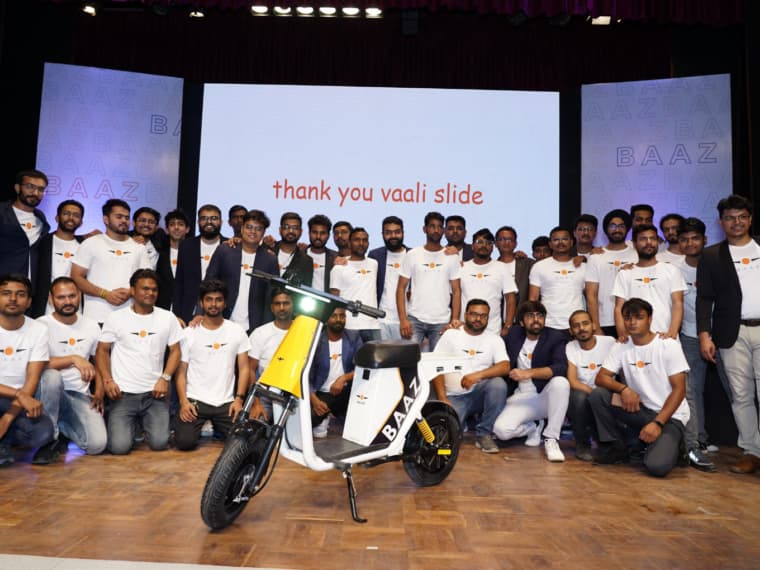
The funding round, which was led by Singapore-based BIG Capital, also saw participation from Rakuten Capital and existing investors like Kalaari Capital and 9Unicorns
Baaz Bikes provides delivery executives access to its low-speed ebikes (Baaz Bikes) and battery swapping stations (Baaz Swap) under a subscription model
The startup currently offers its services in the south Delhi region and is planning to expand its footprints throughout Delhi NCR over the next 10 months or so
Delhi NCR-based electric vehicle (EV) startup Baaz Bikes has raised $8 Mn in its Series A funding round led by Singapore-based BIG Capital to expand and strengthen its ebike offerings for last-mile delivery.
The funding round also saw participation from Japan-based Rakuten Group’s venture capital arm, Rakuten Capital, and existing investors like Kalaari Capital, 9Unicorns, and Sumant Sinha.
Baaz Bikes plans to utilise the fresh capital in four major areas – scaling its EV ecosystem, refining the existing product ecosystem, opening up new ownership models for riders, and launching new line of escooters, Baaz Bikes CEO Anubhav Sharma told Inc42.
Founded in 2019 by four IIT Delhi alumni – Sharma, Shubham Srivastava, Karan Singla, Abhijeet Saxena – Baaz Bikes has built a full stack EV ecosystem that provides the delivery executives of companies, including Zomato, Zepto, and Amazon, access to its low-speed ebikes (Baaz Bikes) as well as battery swapping stations (Baaz Swap) under a subscription model.
The startup currently offers its services in the south Delhi region and is planning to expand its footprints throughout Delhi NCR by strengthening its Baaz Swap infrastructure in the next nine to 10 months, said Sharma.
“We are also looking to start a sell and subscription model where they (gig workers) purchase the escooters and then subscribe only for the energy, the way it works in the ICE market,” he said.
Besides, Baaz Bikes also aims to start manufacturing a new line of escooters that can be used as bike taxis. Currently, its offerings only cater to food and grocery delivery.
Including the latest fund infusion, Baaz Bike has raised $10.3 Mn in total so far. The larger goal of the company in the coming years is to become an enabler for fleet operators, original equipment manufacturers (OEMs), and delivery companies, along with the delivery executives.
Sharma told Inc42 that the startup earns around INR 5,000 per month from each delivery executive. Currently, the company has over 500 vehicles on the road.
The startup is aiming to have a total of 6,000-7,000 escooters on the roads in the next eight months or so. It currently has around 35 swapping stations, which it plans to increase to 300 in the same time frame.
“We are firm believers that EV adoption can only be done in a closed loop environment given the constraints of charging infrastructure. In this regard Baaz Bike has the perfect solution to maximise asset and infrastructure utilisation,” said Preetinder S Panjrath, CFO of BIG Capital, in a statement.
Baaz Bikes’ biggest competitor is Yulu, which has also started collaborating with the delivery companies for better reach and customer acquisition.
“With the commercial EV sector in India poised for substantial growth and Baaz Bike’s strategic positioning, we firmly believe they are on the path to achieving remarkable success in transforming the gig economy and contributing to a more sustainable future,” said Nicole Jang, partner at Rakuten Capital.
With the increasing internet penetration and improving access to smartphones, the gig worker’s market in the country is growing rapidly. As per a NITI Aayog report, the gig workforce is expected to expand to 2.35 Cr workers by 2029-30 from 77 Lakh in 2020-21. Baaz Bikes is looking to leverage this growing gig economy to expand its operations.




 Fintech
Fintech Travel Tech
Travel Tech Electric Vehicle
Electric Vehicle Health Tech
Health Tech Edtech
Edtech IT
IT Logistics
Logistics Retail
Retail Ecommerce
Ecommerce Startup Ecosystem
Startup Ecosystem Enterprise Tech
Enterprise Tech Clean Tech
Clean Tech Consumer Internet
Consumer Internet Agritech
Agritech




























